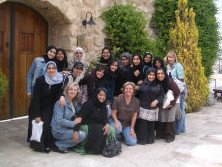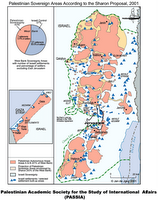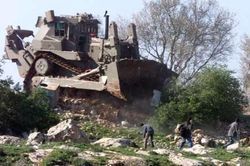
We, in the US, are often accused of being very insular and inward looking. Most of us only speak English and many of us have never traveled outside of the US. (Why should I do this when there is so much of this beautiful country that I have never seen?) We, however, are not the only ones with this attitude. The very conservative Gulf States in the Middle East keep many of their citizens, particularly the women, isolated from other cultures and the rest of the world. Recently, when I was in Jordan looking at some of the development projects with which I have been involved, we discussed with our friends at
Habitat for Humanity-Jordan the upcoming work project by a group of very wealthy young women from an exclusive school in the UAE. They were concerned about what could be expected from these pampered and isolated young women. Could they lift the cement blocks? How would they interact with the people in the poor village? I said to Nancy at HFHJ "You have to send me an email after this work camp. This will be very interesting". I just received this email. What a great story of reaching outside your isolating borders. The story is at once uplifting and hopeful and also sad that they may never experience it again.
Nancy writes:
Happy Easter,
In this time of rebirth and transformation I have an incredible experience I
would like to celebrate with you. Last week we hosted the first all women's volunteer build in Jordan, maybe
the Middle East, but that has yet to be confirmed. The ladies were from
Sharjah College which is located in the United Arab Emirates, a small
country in the Persian Gulf. There were 12 students and 4 chaperones, one of
them being American. She was my main contact, Linda, an American teacher
with the school and she and I had many conversations about what this build
was going to look like given many factors. Some of those being that these
were wealthy young women, from very conservative families, one of them was a
princess from the current ruling family and they all wore the traditional head
scarf and robes. All but two of the girls had never traveled without a
member of their family before, several had never been in an airplane and for
most this would be the first and last trip of this nature. After graduation
they would be married and would not likely have this kind of opportunity
again.
We were anxious and apprehensive as to how this would all work out. Taking
young women into a poor community to build alongside men and members of a
community so vastly different than their world? Would they even be able to
lift a brick, much less be outside for hours at a time? By the end of the
very first day of building our fears were washed away in delight as we saw
the transformation of these women through their determination anopennessss.
As the staff sat together that evening we marveled at this and talked about
how we were going to have to change our build schedule to accommodate the
girls obvious ability to work harder than we had anticipated, this was a
challenge we were more than happy to have.
After the girls had dinner at night they gathered as a group to talk about
what they experienced that day. I wish I had the space here to share all of
these but will use this to share a few;

- Thuriyah - when I was walking back to the hotel from Petra I became very
sad because I realized this would be the last time that I would be on a trip
by myself. I love the way this trip makes me feel freedom, of just being me
and being able to be with my friends.
- Noorah (who actually is a princess) - I kept thinking all day about how
God made it possible for all these people from so many different places to
be here, today, right now, in the same place. I think that is amazing.
- Alawiah - I am so surprised at how easy it is to work around men, I don't
feel uncomfortable at all. I really like how different it is than being with
just women and people that I know well. It makes me feel good about myself.
(Linda tells me that this is an important chance for the girls who will be
allowed to take jobs and work in a place with men and women.)
- Moza - I am overwhelmed that people live like this. I have always known
there are poor people but have never seen them and could not have ever
dreamed that their lives would be like this. I feel so happy to have an
opportunity to help them and make a difference in how they live.
On a humorous note, Linda tells me that Noorah shows up at the airport with
her maid. When she realizes that she can't go through the check point with
her, she asks, who is going to carry my bags? Linda says, well you are.
Noorah says, OK, but I've never done that before. Later in the week she
tells Linda that she some of the things she has learned during the week were
to pack her own bags and do some laundry, she feels pretty proud of herself.
We all have different things to learn right?
The last day I sat in wonder as I watched with delight as these confident
young women, laughing, working side by side created contests to see who
could make more bricks. I also realize that being a woman has given me
incredible access to this whole experience and for that I am grateful.
This is grace, this is the kingdom.
Yours in love,
Nancy
This looks like the kingdom to me as well.
JordanHabitat for HumanityUAE
 bunch of promises (none of them lived up to) and invitations to state dinners all over the world (I hope that the food and wine were good), the situation has continuously deteriorated. Neither side has lived up to its commitments and the proposed Palestinian state has been carved up into separate enclaves bounded by fences/walls, bypass roads and military reserves with no open borders and little internal communication and access. The Israeli governments of Benjamin Netanyahu, Ehud Barak and Ariel Sharon have, since 1993, attempted to establish irreversible facts on the ground in the form of settlements and annexations. They have succeeded. There are now approximately 400,000 settlers east of the 1967 armistice line who would have to be evacuated in order to return to these borders. The evacuation scenario of 8000 settlers in Gaza last year gives one some sense of what this would look like. When we asked if evacuating the settlement in Hebron would create an Israeli civil war, the spokesperson said “I wouldn’t call it probable, but I would call it possible.” This scenario is not politically feasible for the Israelis. The Sharon/Ohmert convergence/disengagement plan “only” requires that 50 – 100 settlements be dismantled and 50-100,000 settlers be expelled from their homes. Even this plan has a lot of opposition in Israel. (Click here to see how much) The disengagement plan (see the map) creates untenable borders for the “Palestinian state” and will never be accepted by any Palestinian government be it Hamas, Fatah or a reincarnation of Yassar Arafat. Can the US help resolve this seemingly irresolvable situation? Simple answer- No! The US has no role as an
bunch of promises (none of them lived up to) and invitations to state dinners all over the world (I hope that the food and wine were good), the situation has continuously deteriorated. Neither side has lived up to its commitments and the proposed Palestinian state has been carved up into separate enclaves bounded by fences/walls, bypass roads and military reserves with no open borders and little internal communication and access. The Israeli governments of Benjamin Netanyahu, Ehud Barak and Ariel Sharon have, since 1993, attempted to establish irreversible facts on the ground in the form of settlements and annexations. They have succeeded. There are now approximately 400,000 settlers east of the 1967 armistice line who would have to be evacuated in order to return to these borders. The evacuation scenario of 8000 settlers in Gaza last year gives one some sense of what this would look like. When we asked if evacuating the settlement in Hebron would create an Israeli civil war, the spokesperson said “I wouldn’t call it probable, but I would call it possible.” This scenario is not politically feasible for the Israelis. The Sharon/Ohmert convergence/disengagement plan “only” requires that 50 – 100 settlements be dismantled and 50-100,000 settlers be expelled from their homes. Even this plan has a lot of opposition in Israel. (Click here to see how much) The disengagement plan (see the map) creates untenable borders for the “Palestinian state” and will never be accepted by any Palestinian government be it Hamas, Fatah or a reincarnation of Yassar Arafat. Can the US help resolve this seemingly irresolvable situation? Simple answer- No! The US has no role as an  effective mediator. A mediator needs to be unbiased, willing to listen to the interests of both sides without judgment and find the common ground. With over 50 years of uncritical support for one side of the conflict, the US cannot be seen by Palestinians as unbiased. At Camp David, Palestinian negotiators dealing with Ehud Barak, Bill Clinton and AIPAC staffers Dennis Ross and Martin Indyck felt like they were negotiating with both Israel and the US. (They were probably right) That leaves us with question – Where do we go from here? Easy answer – beats me, but let’s look at this next time.
effective mediator. A mediator needs to be unbiased, willing to listen to the interests of both sides without judgment and find the common ground. With over 50 years of uncritical support for one side of the conflict, the US cannot be seen by Palestinians as unbiased. At Camp David, Palestinian negotiators dealing with Ehud Barak, Bill Clinton and AIPAC staffers Dennis Ross and Martin Indyck felt like they were negotiating with both Israel and the US. (They were probably right) That leaves us with question – Where do we go from here? Easy answer – beats me, but let’s look at this next time.




